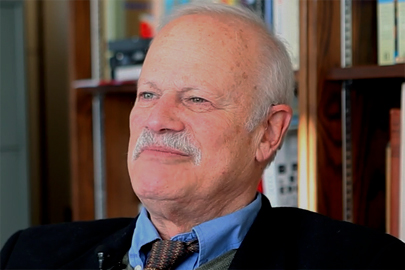Whitfield reflects on living through and teaching American history
American Studies professor looks back at his time on campus.
 Photo/Allison Milligan
Photo/Allison MilliganStephen Whitfield, PhD'76
Social changes and cultural revolution swept through America’s history in the latter half of the 20th century, which puts Brandeis professor Stephen Whitfield, PhD’72, in a unique place.
An American Studies expert, Whitfield, the Max Richter Professor of American Civilization, taught his final class this semester. Much of what he has taught—most notably 20th century American culture—involves events, places, dates and people that came to historical significance throughout his tenure teaching at Brandeis. That tenure began in 1972, just three months after he received his PhD in the History of American Civilization.
“I had never taken a course in American Studies,” said Whitfield, who went on to chair the department. “The first time I experienced American Studies was when I had to teach it.”
In a sense, the course syllabus for the subject matter Whitfield was required to teach was still being formulated when he took a position as an assistant professor. His first years at Brandeis were gripping, most notably with regard to American politics.
“There was the political intensity and excitement of the anti-Vietnam War era,” Whitfield said. “There was an effort to come to terms with shameful aspects of America’s past and a tremendous commitment to understanding what the country did wrong and how to rectify it.”
The impacts of the war were especially palpable at Brandeis, Whitfield said, because the draft had just ended. But his time on campus in the 1970s also saw the country grapple with other key moments in American history, most notably racial inequality and Watergate.
“It was an exciting and thrilling time,” Whitfield said. “Almost every day, the newspapers and evening news had a special shock or fascination. The environment gave class a certain political kick.”
The circumstances of the middle and late 20th century also helped Whitfield feel more attached to his vocation of teaching.
“By teaching something about America, I felt closer to the prospect of political and social change,” said Whitfield. “There was a connection between learning and citizenship. What might occur in the classroom through discussion or lecture might have an impact on the outside world.”
Over the years, Whitfield’s classes have been considered must-takes, as he’s had an impact on both his field and on generations of Brandeis students, many of whom he now considers close friends.
Whitfield has written eight books on politics, culture and Jewish history, the first of which was the PhD dissertation he wrote in 1972 about the radical socialist economist Scott Nearing.
Though teaching will recede into Whitfield’s past, he intends to keep his office for the foreseeable future. He will use it for research on his next book, which will be a political history of Brandeis.
“In terms of the duration of my career here, I have some reason to be qualified to tell this story,” said Whitfield. “It’s about the faculty and alumni who have made a difference in American civic life as activists, writers and thinkers. I’ve already been working on it for a number of years and it’s an extraordinary story.”
Whitfield is thankful for the time he’s spent at Brandeis. Rather than discuss how he has left his mark on the university, he’s more inclined to discuss how the university has left its mark on him.
“I’ve had deep and abiding friendships, sometimes with my colleagues and not the least with the students,” Whitfield said. “I could not have been as happy anywhere else or in any field other than teaching, or at any place other than Brandeis.”
Categories: Alumni, General, Humanities and Social Sciences, Research, Student Life





